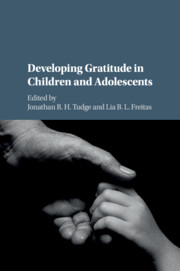Book contents
- Developing Gratitude in Children and Adolescents
- Developing Gratitude in Children and Adolescents
- Copyright page
- Dedication
- Contents
- Figures
- Tables
- Contributors
- Acknowledgments
- 1 Developing Gratitude
- Part I Setting the Scene
- 2 Toward a Psychological Study of the Virtues
- 3 Gratitude in Special Relationships
- Part II Gratitude, Developing
- Part III Developing Gratitude
- Index
- References
3 - Gratitude in Special Relationships
from Part I - Setting the Scene
Published online by Cambridge University Press: 07 December 2017
- Developing Gratitude in Children and Adolescents
- Developing Gratitude in Children and Adolescents
- Copyright page
- Dedication
- Contents
- Figures
- Tables
- Contributors
- Acknowledgments
- 1 Developing Gratitude
- Part I Setting the Scene
- 2 Toward a Psychological Study of the Virtues
- 3 Gratitude in Special Relationships
- Part II Gratitude, Developing
- Part III Developing Gratitude
- Index
- References
- Type
- Chapter
- Information
- Developing Gratitude in Children and Adolescents , pp. 42 - 62Publisher: Cambridge University PressPrint publication year: 2017
References
- 1
- Cited by

